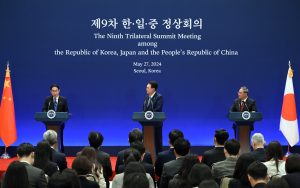The dust from this week’s Japan-China-South Korea trilateral summit in Seoul has settled, and the “breakthrough” of resuming the once-annual meeting after a five-year hiatus was overshadowed by an air of restraint and a lack of meaningful progress.
On the surface, the summit was symbolic of the three countries’ efforts to rebuild a relationship cemented in economic cooperation and regional peace and security. But many of Japan’s longstanding issues with China remain unresolved.
Japanese Prime Minister Kishida Fumio, South Korean President Yoon Suk-yeol and Chinese Premier Li Qiang issued a joint statement confirming plans to regularly hold trilateral summits, which have frequently been canceled in the past due to the countries’ souring relations. The joint statement identified seven areas for mutually beneficial cooperation namely, people-to-people exchanges, sustainable development, economic cooperation, public health, science and technology, digital transformation, as well as disaster relief.
The leaders pledged to focus on mutually beneficial trade and investment, as well as a future-oriented free trade deal. China also expressed eagerness to speed up negotiations on a free trade agreement with Japan and South Korea. Li added that the three countries should regard each other as partners and develop opportunities. But at the same time, Li called on Japan and South Korea to reject protectionism and embrace globalization, referencing China’s worries about Western firms decoupling from China.
The economic focus of the joint statement is indicative of the deep divide over regional security, maintaining international order, and the rule of law. Kishida said that the three countries shoulder a huge responsibility for regional peace and prosperity. For Japan, the urgency of North Korea’s growing nuclearization was bolstered by Pyongyang informing Japan’s Coast Guard of plans to launch a satellite during the trilateral summit. The attempted launch of what would have been North Korea’s second spy satellite failed when the rocket exploded shortly after lift-off.
All leaders agreed that stability of the Korean Peninsula was a common interest but China rejected wording in support of denuclearization of the Korean Peninsula, likely to prevent provoking North Korea. Nevertheless, Pyongyang condemned China, Japan, and South Korea for discussing Korean Peninsula issues.
Japan has grown increasingly isolated in East Asia as a result of ongoing diplomatic disputes with China and South Korea, which had brought bilateral ties to a historic standstill. Since the start of the COVID-19 pandemic, Japan has been protesting against the South Korean court’s order to compensate victims of war-time forced labor. More recently, it has also been battling China’s import ban on Japanese seafood following the release of treated wastewater from the crippled Fukushima Nuclear Power Plan into the ocean. At the same time, Japan has long-standing territorial disputes with China over the Senkaku Islands, known as Diaoyu in China, and Takeshima Islands, known as Dokdo in South Korea.
Ties with Seoul have recently seen a rapid growth spurt, with Yoon taking the initiative to sideline historical issues and bolster trilateral cooperation with Japan, South Korea, and the United States. The Kishida-Yoon bilateral summit on the sidelines of the China-Japan-South Korea meeting acknowledged the warming ties, with plans to make even more progress in time for the 60th anniversary of the normalization of Japan-South Korea relations next year. However, the South Korean public is not convinced, and with Yoon’s rock-bottom approval ratings his outreach to Tokyo might not last beyond his single term.
During the Japan-China Summit which also took place, Kishida urged China to lift its import ban on Japanese seafood. But Li was not prepared to resolve the contentious issues at the summit.
China’s efforts for stepping up economic cooperation stem from the growing concern of a possible prolonged economic war with the United States and its allies. The U.S. has urged partners to “de-risk” by diversifying away from supply chains in China amid a lingering China-U.S. trade spat.
Li made a number of remarks around expanding market access and addressing regulatory barriers during a meeting with South Korean tech giant Samsung on the eve of the summit. He said China is preparing to improve the business environment for foreign firms, stressing that foreign companies are an “indispensable force” for China’s development.
The joint declaration from the trilateral summit sought to demonstrate a new sense of responsibility and a commitment to a steady and sustained trilateral cooperation. The trilateral summit affirmed that all the parties want better relations. But, for China, a hardline stance on issues pertaining to national security remains nonnegotiable.
Instead, China was willing to agree to soft cultural goals. China, Japan, and South Korea designated 2025 and 2026 as years for cultural exchange, announcing plans to increase the number of people-to-people exchanges to 40 million by 2030 by way of tourism and other joint cultural leadership events.
Japan is scheduled to host the next trilateral summit, which should take place in 2025 if the annual schedule can be maintained. A Ministry of Foreign Affairs official said Japan will endeavor to participate in three way talks no matter how bad relations with its neighbors are.

































